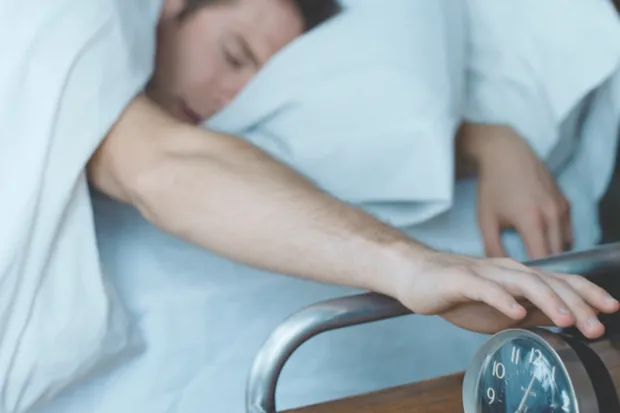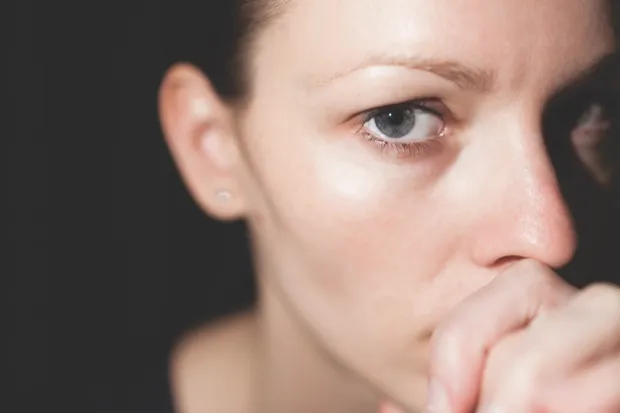1
Social jetlag

Many of us like to treat ourselves to a weekend lie-in after getting up early for work all through the week. But going to sleep and waking up at different times can disrupt your circadian rhythms – the brain’s natural timing of sleep and wakefulness hormone release. This ‘social jetlag’ is associated with sleepiness, feelings of fatigue, bad mood and health problems.
A recent study from the Sleep and Health Research Program at the University of Arizona suggests that each hour of weekday to weekend lag brings an 11 per cent increase in the likelihood of heart disease.
Tip: Avoid weekend lie-ins and late nights, and keep to the same sleep-wake pattern whether you’re a night owl or a morning lark. Using an app or a tracker to chart your sleep patterns can help.
2
Lack of exercise

Although excessive exercise can cause short-term fatigue, long-term tiredness is associated with too little activity. A University of Georgia review of research found 90 per cent of studies agree that people who regularly exercise report less fatigue than groups who don’t. Exercise increases levels of energy-promoting and mood-enhancing neurotransmitters such as dopamine, norepinephrine and serotonin. It also resets the SCN, the part of the brain that regulates sleep and wakefulness hormones. And exercise reduces fat stores, which seem to be associated with long-term fatigue.
Tip: Try and find forms of exercise that fit in with your lifestyle and what you enjoy, rather than automatically investing in a gym membership. This way, you’ll probably be more inclined to stick to it.
3
Cabin fever

Light, fresh air and stimulation are all important for brain health and SCN functioning, so being cooped up indoors all the time can worsen mood and lower energy levels. We’re particularly prone to this during the winter, when days are dark, we’re stuck indoors, and short-term cabin fever can eventually become seasonal affective disorder (SAD). SAD, characterised by depression and feelings of tiredness, is believed to be caused by lack of sunlight, which disrupts the brain’s production of mood and sleep-regulating brain chemicals such as melatonin and serotonin.
Tip: Try and pop outdoors every couple of hours, even if it’s just for a few minutes. It will clear your brain and may help with lethargy and fatigue. Go outside during your lunch break, rather than spending it at your desk.
4
Diet

Being overweight can cause tiredness because your body is having to work harder to perform everyday activities. It also increases your risk of a condition called obstructive sleep apnoea – where the tissues in the throat collapse during sleep, causing airway blockage. This leads to constant sleep interruption and daytime tiredness.
What you eat is also important. Low levels of iron and B vitamins can cause tiredness. And having a diet high in fast-burning sugary carbohydrates, like cakes and biscuits, can leave you feeling tired when the energy rush quickly wears off.
Tip: Dietitians recommend a balanced diet, including complex carbohydrates such as wholemeal bread, brown rice, beans, oats and pulses which are slowly metabolised by the body and lead to less of an energy dip.
5
Caffeine and alcohol

The trouble with drinking coffee is that you need to keep drinking it: one of the commonest symptoms of caffeine withdrawal is fatigue. Research from the Johns Hopkins Medical School found that although caffeine drinkers think their drink of choice improves their performance and mood, in fact it just counteracts the adverse effects of caffeine withdrawal by bringing them back to normal levels of functioning.
Alcohol causes tiredness too. Short-term, it can result in restless sleep and dehydration. Long-term, it can lead to anxiety and depression, which are linked to lethargy and sleeplessness.
Tip: Test whether caffeine or alcohol are the culprits for making you tired. Don’t drink them for at least a week, so you get over any withdrawal symptoms, and see whether you start feeling better.
6
Drugs

Fatigue can be caused be prescribed and recreational drugs. It has been reported as a side effect of statins, allergy medications, hormone therapy and many cancer treatments. According to Frank, the drug information organisation, the high experienced with drugs such as cocaine, speed and ecstasy is often followed by a comedown of tiredness and depression. Scientists at Imperial College London demonstrated that smoking marijuana long-term lowers levels of brain dopamine – a chemical that plays a key role in how we experience motivation, pleasure and reward. This can result in a lack of energy and motivation.
Tip: If you’re on prescription medications, look up possible side effects on the leaflet that comes in the box. Visit your doctor or pharmacist to discuss any concerns. For info about drugs, visit talktofrank.com.
7
Worry and depression

Lack of sleep and fatigue are strongly linked with depression and anxiety. Some researchers believe that widespread depression could be the reason why so many of us feel constantly tired. Studies carried out by the Texas A&M Institute for Neuroscience back up this link. Researchers measured brain oxygen levels when people undertook various physical and mental tasks, and found that they fatigued more quickly when completing complex mental activities. The brain’s resources were being divided. So stress and mental frustration are likely to make us tire more easily, the researchers say.
Tip: Try an NHS mood self-assessment quiz to help establish whether your state of mind is behind your tiredness. If you’re concerned that you or a loved one is suffering from depression, visit your doctor.
This is an extract from issue 313 of BBC Focus magazine.
Subscribe and get the full article delivered to your door, or download the BBC Focus app to read it on your smartphone or tablet. Find out more
Follow Science Focus onTwitter,Facebook, Instagramand Flipboard